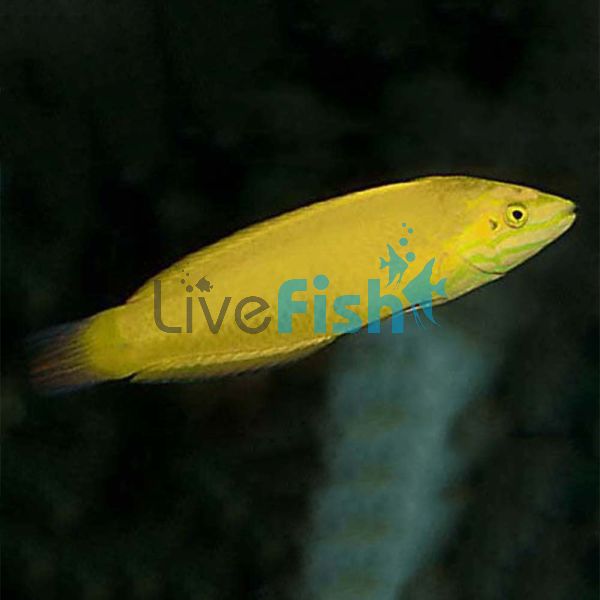Banana Wrasse - Medium
Even if you don't like the fruit you're gonna love this fish. Its brilliant bright colour and personality makes this wrasse a firm favourite among beginner and experienced tank owners alike.
Banana Wrasse
This species of wrasse, as you may have guessed by the name, has a bright yellow to orange colouring and an elongated body with a slight curve. Its fin can have a slight greenish tinge to it along with some small darker "eye spots" along the fins.
Males of this species will have a solid black dot on the forward dorsal fin while the females will be outlined with a different shade of yellow. Females may have one or more secondary spots on the tail fin. This species has been bred in captivity to great success.
These energetic little critters can easily kick up a lot of sand when excited and will even bury themselves in at night to sleep. When acclimatising itself to the tank it may stay hidden in the substrate for a few days. Then once comfortable it will create its bed in the same spot every night and wake up at the same time every morning.
They originate from the Indo-Pacific region from the Christmas Islands over to New South Wales and Japan. They are found at depths between 15 and 60 metres inhabiting slopes on the edges of coral reefs.
Tank Recommendations for the Banana Wrasse
The smallest tank size required for the species of wrasse is 230 liters. They will need some rocks to create crevices to hunt in but these fish will actively move around coral so they are best suited to fish-only aquariums.
They move quite quickly too and can easily jump themselves out of the tank so a well-fitted aquarium cover is essential. Due to their enjoyment of swimming and hunting a longer tank is preferred over a taller one. Make sure to include a sand substrate of at least 10cm (4 inches) which will allow your Banana Wrasse to bury itself when hiding or sleeping.
Suitable Tank Buddies
These fish may pick on smaller more passive tank mates as they grow into adulthood. They can be kept with other Banana Wrasses as long as there is only one male in the tank.
Usually Compatible
As mentioned before it is possible to keep a shoal together as long as there is only one male. Banana Wrasse will cause zero problems with larger tank buddies such as Boxfish, Tangs, and large Angelfish.
Sometime Compatible
This type of wrasse may have conflicts with Dwarf Angelfish, Blennies, and Clownfish. Other species which will have to be monitored carefully are Dragonets, Gobies, and Grunts. Eels, Lionfish and Groupers may see your wrasse as food if not correctly fed. Hogfish, Parrotfish, and Rays should also be watched with a close eye, just in case.
Rarely Compatible
Invertebrates and crustaceans are a no-go unless they are being added solely for the purpose of feeding your Banana Wrasse. Delicate passive creatures such as Seahorses and Pipefish will more than likely get nipped at and bullied into submission. Sharks will prey upon them if given half a chance. Live coral should be avoided too as the wrasse will literally rearrange it while searching for food and cause damage.
Feeding your Banana Wrasse
This species of wrasse is entirely carnivorous and as such requires a meat-only diet which can consist of fortified mysis and brine shrimp. Other frozen and fresh meat-based marine preparations can be offered and they will thrive when being fed twice a day. It has been observed that they sometimes will pick away at parasites living on larger tank mates.
| Scientific Name | Halichoeres Chrysus |
|---|---|
| Care Level | Moderate |
| Common Names | The Banana Wrasse is also known as the Canary Wrasse and the Yellow Coris Wrasse. |
| Diet | Carnivore |
| Fish Family | Labridae |
| Lifespan (years) | 6 |
| Max. Length (cm) | 13 |
| Min. Tank Volume (l) | 230 |
| Origin | Indo-Pacific |
| Reef Safe | No |
| Sociability | Peaceful |
| Venomous | No |
| Water Conditions | 22.2-25.5° C (72-78° F), dKH 8-12, pH 8.1-8.4, sg 1.020-1.025 |




